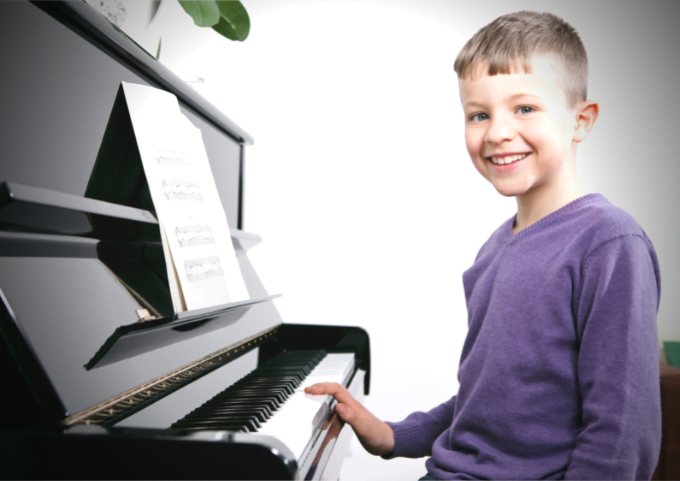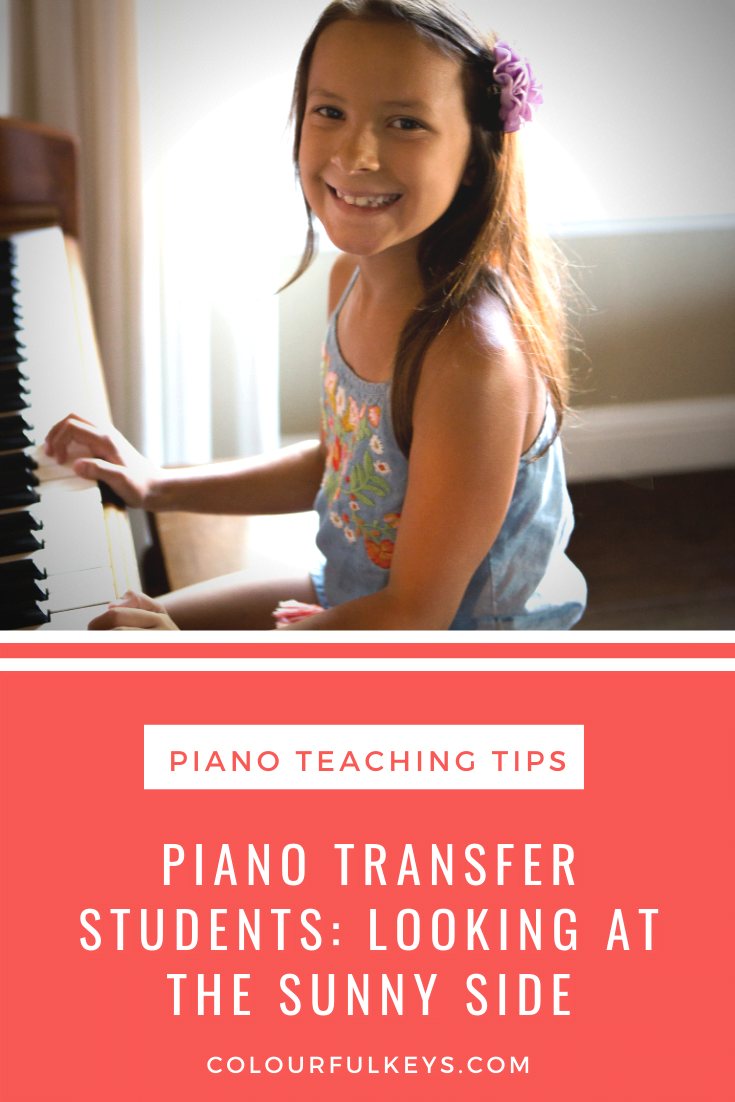Piano transfer students get a bad rap in piano teacher circles. You’ll often see posts lamenting why this or that wasn’t taught or worrying over a bad attitude which seems to have become embedded.
Let’s turn that jalopy around 🚘. Piano transfer students can be a wonderful asset to your studio in so many ways.

⬆️ Listen to the podcast above or keep on reading, whichever fits your style. ↙️
Picture this: 🖼️
You have a new transfer student sitting at your piano, and they can read everything on the page BUT they have a poor sense of pulse.
Or, your new student can play their grade 3 exam pieces perfectly BUT give them a new piece of music, and they are still using mnemonics to work out every single note.
Or, they can read music beautifully with every detail BUT when you suggest anything without a written score they look like they want to crawl under the piano and hide.
This can feel deflating and confounding (where do you begin?!). I know I’ve felt that way over the years. 😵
But transfer music students can actually be wonderful. Let me help you make them a favourite in your studio, too.
You Are a Breath of Fresh Air
It’s a fact of life: Piano students will have many teachers over their lifetime. It’s extremely healthy to have a wide variety of mentors and teachers. Sometimes, you are just what a transfer student needs to feel inspired again.
Think about all the things – big and small – which you might do differently than their previous teacher, and put yourself in your new student’s shoes.

Some of these things will be new and scary to them at first, and some will be exciting. But they’re all going to be great opportunities for growth.
Group Lessons
If you do group workshops in your studio or another type of lesson format, explain how this works to them at the first meeting. Talk about why it’s exciting or what kinds of things it enables you to do.
In my studio, my students take buddy lessons, and we also do regular group workshops. So, at the first meeting with a transfer student, I make sure to explain how these work and some of the cool activities we get to do together.
This is about building excitement, but it also helps nervous transfer students feel more confident. Many kids want to be able to picture what a scenario will be like before they can feel confident attending.
Performance Opportunities
Did the other teacher offer recitals, concerts or other performance opportunities? Even if they did, the performances probably looked quite different to how things go in your studio.
You might think your recitals are quite “ordinary” but the little things go a long way. Look forward to seeing these new performance experiences spark curiosity and engagement in your new transfer student.
Community
If your studio has a strong sense of community and does group projects or special events, this might be just the thing to hook your new transfer student. It’s also a great opportunity to welcome a new cat into your piano studio family so make sure they feel the hospitality from the get-go.
Perspectives
Sometimes it’s not about the big flashy changes. I know I have personally learnt a lot from all my many music teachers (even the not-so-great ones) just because of little human cues.
Your transfer music student might take awhile to get acclimatised, and things could go more slowly than you expect at first. But that’s part of the natural adjustment period.
Know that they are learning a lot during the transition. Even when they’re quiet or seem shy.
Visit my Planning Lessons hub page if you need more breath-of-fresh-air ideas.
You Get More Light bulb Moments
There might be some skills which a piano transfer student has never explored before, such as improvisation or simply playing games in lessons. This is an excellent opportunity to show them another side to learning the piano.
And yes, there also may be some things which they haven’t been taught or haven’t fully comprehended in the way you think they should have.
That doesn’t need to be a cause for ranting, though. Let’s try to see it as an opportunity for more awesome light bulbs!

I know from the emails I get from teachers that we all live for the aha moments. Those times when a student’s face lights up and you can practically hear the “Click!” in their prefrontal cortex.
Games
My absolute favourite thing to do with new piano transfer students is to play games with them. There are 3 huge benefits to this:
- I get to find out what they know and don’t know without it feeling like a quiz.
- We get to have fun together and build a relationship.
- They think their new teacher is awesomely cool and fun. 😎
So if your first step with a new student isn’t already to play some awesome music theory games, get on it.
Movement
Many students will have had a rather stationary piano lesson experience up to now…but that will change when they join my studio. We move to learn patterns, to improve our rhythm and as part of the games we play.
You can discover a lot about students from how they move to music. But even more important is the effect this has on them.
For many, moving their bodies is how they understand the world. Movement-based activities might have light bulbs going off one after the other like a string of fairy lights.
Improvisation
I improvise with every student in their first lesson. It doesn’t matter whether they are 3 years old or 33 or 97. I don’t care whether they’re a newbie or have played Rachmaninov. If they join my studio – we’re going to start with some free play.
Some piano transfer students will be nervous of this at first. And that’s totally understandable.
But if you provide support with a great accompaniment pattern and give them some simple guide rails to ensure they sound fantastic, they’ll be hooked in no time.
Composition
My new students soon learn that they’re not just going to be playing the music of others anymore; they’re going to write their own. For many this will be more like a brain explosion moment than a little light bulb. 🤯
Again, this can make piano transfer students nervous. We want to be cognisant of that and give them even more step-by-step guidance than we might give a new student. But once they get rid of those initial butterflies, the pay-off will be written all over their face.
Playing-by-Ear
If you’ve been trained to follow the written music to the dot, a blank music stand can be intimidating. But once those transfer students who came from a strictly notation-based studio start to trust their ears, you can see their faces light up.
They never thought they could do that! Playing-by-ear seemed like the reserve of a select few with some kind of natural gift, not a skill they could cultivate.
All students can train their ears. And some will love the process of figuring out a song from nothing.
New Genres
If your piano transfer student came from an all-classical studio, exploring different genres of music is a new experience for them. When it comes to selecting new books for this student, make sure to send them diverse options which they can listen to before deciding.

They might be surprised to discover some new types of music they had never even heard of which they love and which renew their enthusiasm for practice!
You Get to Introduce a Different Mindset
Exams or festivals may have been a normalised and an expected part of learning the piano for this transfer student. They may also come with certain mindsets around perfectionism and practice.
This is an excellent opportunity to help them grow outside of their music studies and deepen their love of playing and practising.
Growth Mindset
Many students will have learned, through their lessons or just the world in general, that they are either “good” or “bad” at something. Even when folks don’t express it explicitly, the idea of natural talent is rampant in the music world.
You have an opportunity here to turn a fixed mindset into a gritty growth-oriented one. The trick is to nudge rather than push.
Check out this article and podcast about developing grit in piano students if you need help in this area.
Practice Expectations
This is simultaneously an opportunity and a pothole.
Your piano transfer students come with certain expectations of how much and how they should be practising. They may already be in a certain groove with practising…and it might not always be the best scenario.
But they’ve also never been your student before.
So when they first join your studio you have the perfect opening to make a change. You just need to take it.
Don’t shy away from laying out how practice works in your studio and what you expect from them. Make some friendly enquiries into how it’s been working for them so far, too, and offer support with any challenges they’ve faced.
For many piano parents, practice becomes an area of guilt and frustration. Take a supportive and bolstering role from the outset and your student will be so much better off for it.
Transfer Music Students Can Teach YOU
Sometimes, transfer students and their parents will come to you with tips and tools which their previous teacher used which motivated them. This is an opportunity to learn new things yourself.
Don’t miss this opportunity for growth!
It’s so easy for us to get used to our habits as teachers and the way we do things. But if we’re not careful, a routine can quickly become a rut.
The next time you have a piano transfer student, sit up and pay attention. You just might learn a few things yourself. 💡
What benefits have you experienced by taking on your most recent piano transfer student?
I’d love to hear your thoughts on this in the comments below. 🙂

I am probably the poster child for transfer students. Between the ages of 8 and 18 I had six different teachers. I learned different things and grew in my playing with each of them. At the time I was the child who could sight read anything but could not keep at steady pulse. Each teacher was patient and had new ideas to help. They all would be pleased to know that I now am a church musician, hand bell director, and piano teacher.
All students have something they struggle with. For transfer students we get to witness their playing with new ears and eyes. Then we can help them use their super powers to overcome their weaknesses. One of my high school teachers had me sight read duets with her during concerts. I did not like it at the time but I was successful. I will be forever grateful for her!
What a wonderful perspective, thank you for sharing!